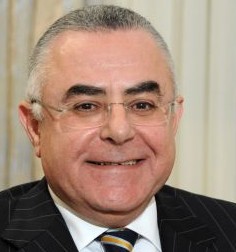
(AFP Photo)
By Abdel Rahman Yusuf
Director of the Middle East and Central Asia Department in IMF Masood Ahmed welcomed the Central Bank of Egypt’s (CBE) procedures to diminish the foreign exchange black market.
Ahmed said the attempts to narrow the gap between the parallel (or black) and official market, as well as unifying the market, help in settling investments and growth.
He added, during a press conference held in Washington regarding the Middle East and Caucasus regions’ economic outlook, that the Sharm El-Sheikh Economic Summit’s success needs to be translated into big investments. These will therefore help in increasing growth, which in turn requires economic reforms.
Ahmed said the Gulf states still have a major role in supporting Egypt’s economy, despite the reduction of oil prices and its impacts on Gulf Cooperation Council (GCC) countries.
The IMF is alert to the formation of growth and relating it to work and life standards, without merely looking into the total figures, Ahmed confirmed.He said this in relation to the IMF’s projecting an increase in growth rates to 4.4% next year in Egypt, and a reduction in the unemployment rate to 12.5%.
As for oil exporting countries, Ahmed said the major message for them is that despite the reduction in oil prices, the financial walls they have recently built will limit this impact on their current accounts. They should diversify their economy in the next period, instead of mainly relying on oil, he added.
According to Ahmed, the IMF expected that the growth rate of oil exporting countries this year will be at 2.5%, like last year.TheIMF meanwhile expected a growth estimated at 3.5% for GCC countries.
Ahmed noted that only two countries will avoid budget deficits, and they are Kuwait and Qatar, while the rest of the countries will suffer from a budget deficit, expecting oil prices this year to be low. He added that these countries need to limit their spending in order to keep sustainable growth and maintain resources for future generations.
As for non-oil-exporting countries, Ahmed believes that they have gone through four lean years. They are, however, expected to profit from the reduction in oil prices, while the expected growth rate for these countries is 4%. Improvements of these countries’ deficits are also expected.
Regarding potential risks this year, Ahmed said that three risks are expected to take place, including the provision of jobs for youth, implications resulting from conflicts we live in, and changes in oil prices.
Ahmed described the framework agreement between Iran and theP 5+1 group as a step forward towards impacting economy, whether in Iran or countries dealing with Iran economically. He pointed out there are no clear quantitative results of the level of this effect; however, the Iranian economy is improving. Inflation went down from 40% to 16% in the past few years, assuring that there are better, healthier policies now.
Regarding Yemen, Ahmed said the discussionsbetween Yemen and the IMF regarding the economic reform programme are currently at a halt until a political settlement is reached. He described the conflict in Yemen as a human tragedy.
As per the conflict’s impact on Yemen’s economy, Ahmed pointed out that oil production reached less than 40%, and cash reserves have dropped to a quarter this year, with half the population living below the poverty line. Unemployment among youth reached 40%. He stressed on creating a quick solution in order to put an end to the conflict.
